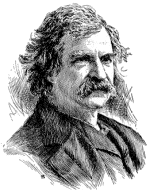The Boys’ Life of Mark Twain
by Paine

LIV. Return After Exile
News came to Vienna of the death of Orion Clemens, at the age of seventy- two. Orion had died as he had lived–a gentle dreamer, always with a new plan. He had not been sick at all. One morning early he had seated himself at a table, with pencil and paper, and was putting down the details of his latest project, when death came–kindly, in the moment of new hope. He was a generous, upright man, beloved by all who understood him.
The Clemenses remained two winters in Vienna, spending the second at the Hotel Krantz, where their rooms were larger and finer than at the Metropole, and even more crowded with notabilities. Their salon acquired the name of the “Second Embassy,” and Mark Twain was, in fact, the most representative American in the Austrian capital. It became the fashion to consult him on every question of public interest, his comments, whether serious or otherwise, being always worth printing. When European disarmament was proposed, Editor William T. Stead, of the “Review of Reviews,” wrote for his opinion. He replied:
“DEAR Mr. STEAD,–The Tsar is ready to disarm. I am
ready to disarm. Collect the others; it should not be
much of a task now. MARK TWAIN.”
He refused offers of many sorts. He declined ten thousand dollars for a tobacco endorsement, though he liked the tobacco well enough. He declined ten thousand dollars a year for five years to lend his name as editor of a humorous periodical. He declined another ten thousand for ten lectures, and another offer for fifty lectures at the same rates– that is, one thousand dollars per night. He could get along without these sums, he said, and still preserve some remnants of his self- respect.
It was May, 1899, when Clemens and his family left Vienna. They spent a summer in Sweden on account of the health of Jean Clemens, and located in London apartments–30 Wellington Court–for the winter. Then followed a summer at beautiful Dollis Hill, an old house where Gladstone had often visited, on a shady hilltop just outside of London. The city had not quite enclosed the place then, and there were spreading oaks, a pond with lily-pads, and wide spaces of grassy lawn. The place to-day is converted into a public garden called Gladstone Park. Writing to Twichell in mid- summer, Clemens said:
“I am the only person who is ever in the house in the daytime, but I
am working, and deep in the luxury of it. But there is one
tremendous defect. Levy is all so enchanted with the place and so
in love with it that she doesn’t know how she is going to tear
herself away from it.”
However, there was one still greater attraction than Dollis Hill, and that was America–home. Mark Twain at sixty-five and a free man once more had decided to return to his native land. They closed Dollis Hill at the end of September, and October 6, 1900, sailed on the Minnehaha for New York, bidding good-by, as Mark Twain believed, and hoped, to foreign travel. Nine days later, to a reporter who greeted him on the ship, he said:
“If I ever get ashore I am going to break both of my legs so I can’t
get away again.”
 Continue...
Continue...![[Buy at Amazon]](../images.amazon.com/images/P/B0006AHKG6.01.MZZZZZZZ.gif)